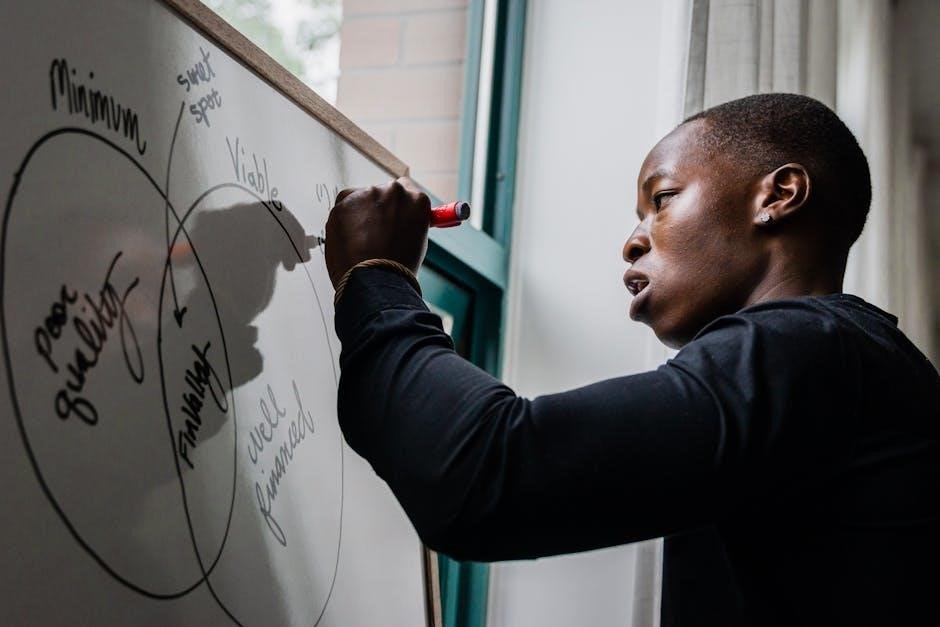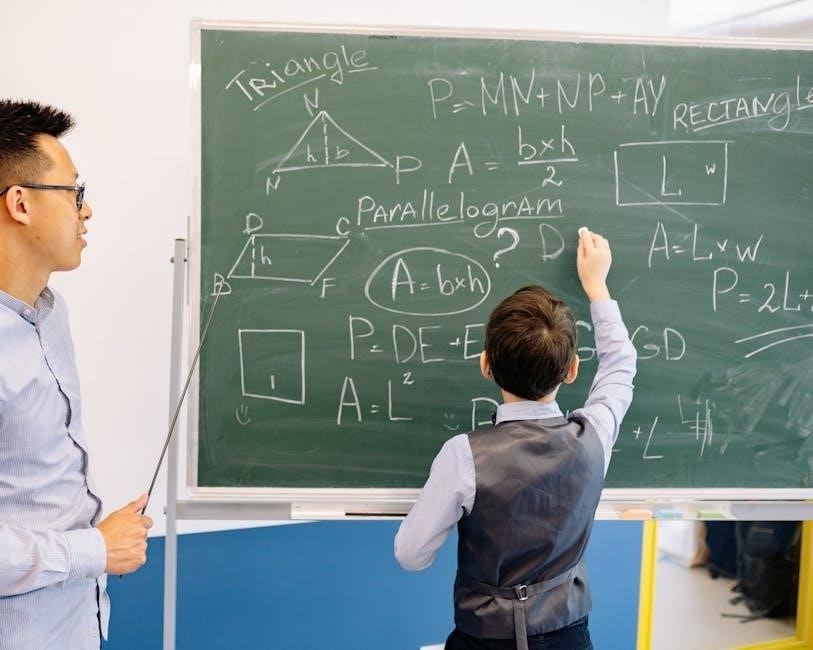
An Instructional Dean oversees academic programs, curriculum development, and faculty support, playing a crucial role in educational leadership and strategic initiatives to enhance teaching and student success.
1.1 Overview of the Position
The Instructional Dean is a senior academic leader responsible for overseeing educational programs, curriculum design, and faculty development. They ensure academic quality, align programs with institutional goals, and foster innovation in teaching and learning. This role involves strategic planning, collaboration with stakeholders, and supporting student success initiatives. Instructional Deans also manage budgets, assess program effectiveness, and stay abreast of educational trends to drive continuous improvement. Their work is pivotal in creating a conducive learning environment and advancing the institution’s academic mission.
1.2 Importance in Educational Institutions
The Instructional Dean is pivotal in maintaining academic excellence and driving institutional goals. They ensure programs align with strategic objectives, foster innovation, and support faculty development. By overseeing curriculum and student success initiatives, they enhance the quality of education and student outcomes. Their role in adapting to educational trends and managing challenges ensures the institution remains competitive and relevant. The Instructional Dean’s leadership directly impacts the academic environment, making them essential for sustaining and advancing the institution’s mission and vision.

Key Responsibilities of an Instructional Dean
An Instructional Dean oversees academic programs, curriculum development, and faculty support while driving student success initiatives to foster a supportive and innovative learning environment.
2.1 Academic Program Oversight
An Instructional Dean is responsible for overseeing the development, implementation, and assessment of academic programs to ensure alignment with institutional goals. This involves collaborating with faculty to design curricula, monitor program effectiveness, and maintain accreditation standards. The dean also evaluates program outcomes, ensuring they meet student and industry needs. By leveraging data-driven insights and staying attuned to educational trends, the dean fosters innovation and continuous improvement in academic offerings, ultimately enhancing student success and institutional reputation.
2.2 Curriculum Development and Implementation
An Instructional Dean plays a pivotal role in curriculum development, ensuring programs align with educational standards and institutional goals. They collaborate with faculty to design and update courses, incorporating feedback from stakeholders. The dean also oversees the implementation process, ensuring seamless integration of new curricula. By leveraging technology and data-driven approaches, they enhance the educational experience. This role involves continuous assessment and adaptation to evolving academic trends, fostering a dynamic and relevant curriculum that prepares students for future challenges.
2.3 Faculty Support and Development
The Instructional Dean is instrumental in fostering faculty growth by providing professional development opportunities, mentorship programs, and resources to enhance teaching effectiveness. They work closely with faculty members to identify development needs, offering workshops and training sessions. Additionally, the dean ensures faculty have access to tools and technologies that support innovative teaching methods. By prioritizing faculty well-being and career advancement, the dean creates a supportive environment that promotes academic excellence and student success. This role is essential for maintaining high educational standards and fostering a collaborative academic community.
2.4 Student Affairs and Success Initiatives
The Instructional Dean plays a pivotal role in advancing student success through targeted initiatives that support academic achievement and personal growth. By collaborating with faculty and student affairs professionals, the dean ensures that programs are designed to meet students’ diverse needs. This includes implementing advising strategies, fostering inclusive learning environments, and promoting engagement opportunities. The dean also advocates for resources that address barriers to student success, such as mental health services and academic support centers, ensuring that all students have the tools needed to thrive academically and beyond.

Challenges Faced by Instructional Deans
Instructional Deans face challenges like balancing administrative duties with educational goals, managing faculty morale, and adapting to evolving educational trends and technologies while maintaining academic quality.
3.1 Balancing Administrative and Educational Duties
Instructional Deans must balance administrative tasks, such as budgeting and policy implementation, with educational priorities, like curriculum development and faculty support. This dual role demands strong organizational and time management skills to ensure both areas receive adequate attention. Effective deans communicate clearly with stakeholders to align administrative decisions with educational goals, fostering a cohesive environment that supports teaching and learning. Striking this balance is crucial for maintaining academic quality and institutional effectiveness.
3.2 Managing Faculty Morale and Conflict Resolution
Instructional Deans play a vital role in maintaining faculty morale by fostering a supportive work environment and addressing concerns promptly. They must navigate conflicts between faculty members, departments, or staff, ensuring fair and constructive resolutions. Effective communication and empathy are key to resolving disputes while preserving relationships. By promoting collaboration and recognizing achievements, deans can enhance overall satisfaction and productivity among faculty, creating a positive academic culture that benefits both educators and students alike.
3.3 Adapting to Educational Trends and Technologies
Instructional Deans must stay ahead of evolving educational trends and technologies, integrating innovations like online learning platforms and data analytics to enhance teaching and student outcomes. They assess the effectiveness of new tools and methodologies, ensuring seamless implementation. By fostering a culture of adaptability, deans enable faculty to embrace change while maintaining academic excellence. Collaboration with IT departments and industry experts further supports the adoption of cutting-edge solutions, ensuring the institution remains competitive and aligned with global educational advancements.
Essential Skills for an Effective Instructional Dean
An effective Instructional Dean requires strong leadership, excellent communication, strategic planning, and problem-solving skills to manage academic programs, support faculty, and drive student success initiatives.
4.1 Leadership and Visionary Skills
Instructional Deans must possess strong leadership and visionary skills to guide academic departments effectively. They envision long-term goals, inspire faculty, and align programs with institutional missions. By fostering innovation and collaboration, they create environments that support both student success and faculty development. Visionary leaders anticipate educational trends, adapting strategies to meet future challenges. Their ability to motivate and direct teams ensures the achievement of academic excellence and institutional objectives. Effective leadership is foundational to their role in driving sustainable growth and improvement in education.
4.2 Communication and Interpersonal Skills
Effective communication and interpersonal skills are essential for Instructional Deans to build strong relationships with faculty, students, and stakeholders. They must articulate vision clearly, listen actively, and foster open dialogue to resolve conflicts and align goals. Strong interpersonal abilities enable them to collaborate across departments, negotiate resources, and maintain a positive work environment. Transparent communication fosters trust and cooperation, while emotional intelligence helps navigate complex interactions. These skills are vital for mediating disputes, mentoring faculty, and ensuring collective efforts toward institutional objectives.
4.3 Strategic Planning and Problem-Solving
Instructional Deans must excel in strategic planning and problem-solving to align academic goals with institutional missions. They analyze data to inform decisions, anticipate challenges, and develop solutions. Strategic thinking enables them to allocate resources effectively and prioritize initiatives that enhance educational quality. Problem-solving involves addressing conflicts, optimizing processes, and adapting to changing needs. By fostering collaboration and innovation, they ensure that academic programs remain relevant and impactful, driving long-term success for both students and faculty while maintaining institutional competitiveness.

Impact on Educational Quality and Innovation
Instructional Deans drive educational innovation by fostering curriculum development, collaboration, and student-centered approaches, enhancing academic quality and institutional effectiveness.
5.1 Driving Curriculum Innovation
Instructional Deans play a pivotal role in advancing curriculum innovation by integrating new technologies, fostering interdisciplinary approaches, and aligning programs with emerging educational trends. They identify gaps in existing curricula and collaborate with faculty to design modern, relevant courses that meet student needs. By leveraging data and stakeholder feedback, they ensure that academic offerings remain competitive and responsive to industry demands. This proactive approach not only enhances student learning outcomes but also positions the institution as a leader in educational innovation.
5.2 Fostering Collaboration Between Departments
Instructional Deans actively promote collaboration across academic departments to enhance resource sharing, interdisciplinary learning, and innovation. By facilitating regular meetings and cross-departmental projects, they encourage faculty to align their expertise and address common challenges. This fosters a culture of teamwork and mutual support, leading to more cohesive and effective academic programs. Such collaboration not only strengthens institutional efficiency but also enriches the educational experience for students, preparing them for real-world scenarios that require interdisciplinary problem-solving and teamwork.
5.3 Promoting Student-Centered Learning
Instructional Deans prioritize student-centered learning by implementing tailored strategies to meet diverse needs. They foster environments where students are active participants, emphasizing personalized attention and adaptive teaching methods. Deans collaborate with faculty to integrate innovative technologies and resources, ensuring curriculum aligns with student interests and career goals. By promoting inclusivity and accessibility, they help students thrive academically and emotionally. This approach not only enhances academic outcomes but also prepares students for lifelong learning and success in an ever-evolving world.

Case Studies and Real-World Examples
Real-world examples highlight how Instructional Deans implement successful programs, driving innovation and improving student outcomes through strategic initiatives and collaborative efforts in educational settings.
6.1 Successful Initiatives Led by Instructional Deans
Instructional Deans have spearheaded transformative initiatives, such as curriculum innovations, faculty development programs, and student success strategies. For instance, some deans have implemented hybrid learning models, blending traditional and online education, while others have introduced mentorship programs to enhance student retention. These efforts often involve collaboration with faculty and staff to ensure alignment with institutional goals. By fostering a culture of innovation and support, Instructional Deans play a pivotal role in advancing academic excellence and student achievement, setting benchmarks for others to follow.
6.2 Lessons Learned from Various Institutions
Institutions have learned that effective leadership by Instructional Deans is crucial for academic success. Common challenges include balancing administrative duties with educational goals and maintaining faculty morale. Successful strategies often involve fostering collaboration, investing in professional development, and leveraging technology. Many institutions emphasize the importance of adaptability and data-driven decision-making. By prioritizing student-centered approaches, Instructional Deans can drive meaningful change. These lessons highlight the need for visionary leadership and a commitment to innovation in education.

Professional Development for Aspiring Instructional Deans
Aspiring Instructional Deans benefit from advanced educational credentials, leadership training, and networking opportunities to build skills in academic leadership and strategic planning for educational excellence.
7.1 Educational Background and Qualifications
An Instructional Dean typically requires an advanced degree, such as a master’s or doctorate, in education or a related field. They often begin as faculty members, gaining teaching and leadership experience. Professional certifications in educational leadership and administrative experience are also crucial. Many Instructional Deans have a proven track record in curriculum development, academic program management, and faculty mentorship. Their educational background and qualifications equip them to lead effectively and drive institutional goals forward.
7.2 Leadership Training and Workshops
Leadership training and workshops are essential for aspiring Instructional Deans to develop strategic planning, communication, and conflict resolution skills. These programs often focus on fostering visionary leadership and collaboration. Workshops may include sessions on curriculum innovation, faculty development, and student success strategies. By participating in such training, future deans gain practical insights and tools to manage academic programs effectively, ensuring they can lead with confidence and drive positive change within their institutions.
7.3 Networking Opportunities in Education
Networking opportunities are vital for Instructional Deans to build relationships with peers and stay updated on educational trends. Professional associations, conferences, and workshops provide platforms for collaboration and knowledge sharing. Online forums and communities also enable deans to connect with colleagues globally. Participating in these networks fosters access to resources, best practices, and innovative strategies. Such opportunities are essential for career growth and for staying informed about emerging technologies and methodologies in education. They also facilitate mentorship and collaborative projects, enhancing leadership skills and institutional impact.

Tools and Resources for Instructional Deans
Instructional Deans utilize educational software, data analytics tools, and professional associations to manage programs, track performance, and stay updated on best practices in academic leadership.
8.1 Educational Software and Management Tools
Educational software and management tools are essential for Instructional Deans to streamline tasks, enhance efficiency, and support decision-making. These tools include learning management systems (LMS), student information systems, and curriculum design platforms. They enable deans to track student progress, manage faculty workflows, and analyze academic performance. Additionally, tools like Google Workspace and Microsoft Teams facilitate collaboration and communication. Advanced search features and filters help deans quickly access relevant data, ensuring informed decisions. These technologies are vital for modern academic leadership, promoting innovation and organizational excellence in educational institutions.
8.2 Data-Driven Decision Making Resources
Data-driven decision-making resources empower Instructional Deans to make informed choices using analytics and insights. Tools like academic dashboards and performance metrics allow tracking of student outcomes, program effectiveness, and faculty productivity. Benchmarking tools compare institutional performance against peers, while predictive analytics forecasts trends and student success. These resources enable deans to allocate resources effectively, identify areas for improvement, and measure the impact of initiatives. By leveraging data, Instructional Deans can drive strategic planning and foster a culture of continuous improvement in education.
8.3 Professional Associations and Networks
Professional associations and networks provide Instructional Deans with essential resources, leadership training, and collaboration opportunities. Organizations like the American Council on Education (ACE) and the Association of American Colleges and Universities (AAC&U) offer workshops, conferences, and access to best practices in educational leadership. These networks facilitate knowledge sharing among peers and exposure to innovative strategies, empowering deans to enhance academic programs and student success initiatives effectively.

The Future of the Instructional Dean Role
The future of Instructional Deans involves integrating advanced technologies, expanding online learning, and adapting to global educational trends to enhance academic leadership and student success strategies.
9.1 Impact of Technology on Administrative Roles
Technology is reshaping the role of Instructional Deans by streamlining administrative tasks and enhancing decision-making. Tools like educational software and data analytics enable deans to track student performance and program effectiveness more efficiently. Online platforms facilitate collaboration and communication, while AI-driven solutions support predictive analytics for enrollment and resource allocation. These advancements not only improve operational efficiency but also allow deans to focus more on strategic initiatives and student success. However, balancing technology integration with traditional leadership skills remains critical for effective academic administration.
9.2 Evolving Responsibilities in Online Education
The rise of online education has expanded the role of Instructional Deans, requiring them to oversee digital learning platforms, ensure program quality, and support faculty in developing online courses. Deans must now manage the integration of technology, address accessibility issues, and ensure equitable learning experiences. They also play a key role in fostering collaboration between academic departments and online learning teams. As online education grows, Instructional Deans must adapt to new challenges, such as monitoring student engagement and ensuring data-driven decision-making in virtual environments, while maintaining academic integrity and standards.
9.3 Adapting to Global Educational Trends
Instructional Deans must stay attuned to global educational trends, such as the integration of technology, interdisciplinary learning, and cultural inclusivity. They play a pivotal role in implementing these trends by aligning institutional goals with worldwide best practices. This involves fostering international collaborations, adopting innovative teaching methods, and ensuring faculty are trained to address diverse student needs. By embracing global trends, Instructional Deans help institutions remain competitive and relevant, preparing students for an increasingly interconnected world while maintaining high academic standards and cultural sensitivity.
The Instructional Dean plays a vital role in shaping academic excellence, fostering innovation, and supporting both faculty and students, ensuring institutions thrive in evolving educational landscapes.
10.1 Summary of Key Points
The role of an Instructional Dean is pivotal in academic leadership, encompassing oversight of programs, curriculum development, faculty support, and student success initiatives. They balance administrative duties with educational goals, manage faculty morale, and adapt to emerging trends. Effective deans possess strong leadership, communication, and strategic planning skills. By driving innovation, fostering collaboration, and promoting student-centered learning, they significantly impact educational quality. Professional development and access to tools and resources further enhance their effectiveness. The future of this role lies in embracing technology and global trends, ensuring continued relevance and impact in evolving educational landscapes.
10.2 Reflection on the Role’s Significance
The role of an Instructional Dean is pivotal in shaping academic excellence and institutional growth. By leading curriculum innovation, fostering collaboration, and prioritizing student success, deans significantly influence the quality of education. Their ability to balance administrative and educational duties ensures alignment with institutional missions. Effective deans inspire faculty, drive strategic initiatives, and adapt to evolving educational landscapes. Their commitment to student-centered learning and professional development underscores their vital impact on both students and educators, making their role indispensable in advancing educational goals and fostering a culture of continuous improvement and innovation.